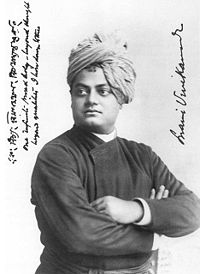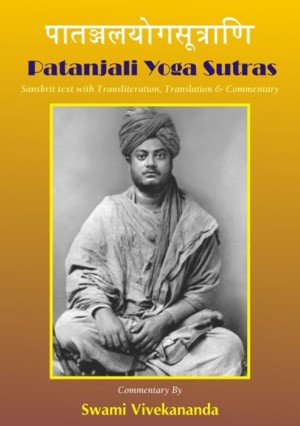20. द्रष्टा दृशिमात्रः शुद्धोऽपि प्रत्ययानुपश्यः ॥२०॥
draṣṭā dṛśimātraḥ śuddho-'pi pratyaya-anupaśyaḥ ||20||
The seer is intelligence only, and though pure, seen through the colouring of the intellect.
This is again Sankhya philosophy. We have seen from this philosophy that from the lowest form up to intelligence all is nature, but beyond nature are Purusas (souls), and these have no qualities. Then how does the soul appear to be happy or unhappy? By reflection. Just as if be piece of pure crystal be put on a table and a red flower be put near it, the crystal appears to be red, so all these appearances of happiness or unhappiness are but reflections; the soul itself has no sort of colouring. The soul is separate from nature; nature is one thing, soul another, eternally separate. The Sankhyas say that intelligence is a compounds, that it grows and wanes, that it changes, just as the body changes, and that its nature is nearly the same as that of the body. As a fingernail is to the body, so is body to intelligence. The nail is a part of the body, but it can be pared off hundreds of times, and the body will still last. Similarly, the intelligence lasts æons, while this body can be pared off, thrown off. Yet intelligence cannot be immortal, because is changes - growing and waning. Anything that changes cannot be immortal. Certainly intelligence is manufactured, and that very fact shows us that there must be something beyond that, because it cannot be free. Everything connected with matter is in nature, and therefore bound for ever. Who is free? That free one must certainly be beyond cause and effect. If you say that the idea of freedom is a delusion, I will say that the idea of bondage is also a delusion. Two facts come into our consciousness, and stand or fall by each other. One is that we are bound. If we want to go through a wall, and our head bumps against that wall, we are limited by that wall. At the same time we find will, and think we can direct our will everywhere. At every step these contradictory ideas are coming to us. We have to believe that we are free, yet at every moment we find we are not free. If one idea is a delusion, the other is also a delusion, because both stand upon the same basis - consciousness. The Yogi says both are true; that we are bound so far as intelligence goes, that we are free as far as the soul is concerned. It is the real nature of man, the Soul, the Purusa, which is beyond all law of causation. Its freedom is percolating through layers and layers of matter, in various forms of intelligence, and mind, and all these things. It is its light which is shining through all. Intelligence has no light of its own. Each organ has a particular centre in the brain; it is not that all the organs have one centre; each organ is separate. Why do all these perceptions harmonise, and where do they get their unity? If it were in the brain there would be one centre only for the eyes, the nose, the ears, while we know for certain that there are different centres for each. But a man can see and hear at the same time, so a unity must be back of intelligence. Intelligence is eternally connected with the brain, but behind even intelligence stands the Purusa, the unit, where all these different sensations and perceptions join and become one. Soul itself is the centre where all the different organs converge and become unified, and that Soul is free, and it is its freedom that tells you every moment that you are free. But you mistake, and mingle that freedom every moment with intelligence and mind. You try to attribute that freedom to the intelligence, and immediately find that intelligence is not free; you attribute that freedom to the body, and immediately nature tells you that you are again mistaken. That is why there is this mingled sense of freedom and bondage at the same time. The Yogi analyses both what is free and what is bound, and his ignorance vanishes. He finds that the Purusa is free, is the essence of that knowledge which, coming through the Buddhi, becomes intelligence, and, as such, is bound.
21. तदर्थ एव दृश्यस्यात्मा ॥२१॥
tadartha eva dṛśyasya-ātmā ||21||
Nature has no light of its own. As long as the Purusa is present in it, it appears light, but the light is borrowed; just as the moon’s light is reflected. All the manifestations of nature are caused by this nature itself, according to the Yogis; but nature has no purpose in view, except to free the Purusa.
22. कृतार्थं प्रतिनष्टंप्यनष्टं तदन्य साधारणत्वात् ॥२२॥
kṛtārthaṁ pratinaṣṭaṁ-apy-anaṣṭaṁ tadanya sādhāraṇatvāt ||22||
Though destroyed for him whose goal has been gained, yet is not destroyed, being common to others.
The whole idea of this nature is to make the Soul know that it is entirely separate from nature, and when the Soul knows this, nature has no more attractions for it. But the whole of nature vanishes only for that man who has become free. There will always remain an infinite number of others, for whom nature will go on working.
23. स्वस्वामिशक्त्योः स्वरूपोप्लब्धिहेतुः संयोगः ॥२३॥
svasvāmi-śaktyoḥ svarūp-oplabdhi-hetuḥ saṁyogaḥ ||23||
Junction is the cause of the realisation of the nature of both the powers, the experienced and its Lord.
According to this aphorism, when this Soul comes into conjunction with nature, both the power of the Soul and the power of nature become manifest in this conjunction, and all these manifestations are thrown out. Ignorance is the cause of this conjunction. We see every day that the cause of our pain or pleasure is always our joining ourselves with the body. If I were perfectly certain that I am not this body, I should take no notice of heat and cold, or anything of the kind. This body is a combination. It is only a fiction to say that I have one body, you another, and the sun another. The whole universe is one ocean of matter, and you are the name of a little particle, and I of another, and the sun of another. We know that this matter is continuously changing, what is forming the sun one day, the next day may form the matter of our bodies.
24. तस्य हेतुरविद्या ॥२४॥
tasya hetur-avidyā ||24||
Ignorance is its cause.
Through ignorance we have joined ourselves with a particular body, and thus opened ourselves to misery. This idea of body is a simple superstition. It is superstition that makes us happy or unhappy. It is superstition caused by ignorance that makes us feel heat and cold, pain and pleasure. It is our business to rise above this superstition, and the Yogi shows us how we can do this. It has been demonstrated that, under certain mental conditions, a man may be burned, yet, while that condition lasts, he will feel no pain. The difficulty is that this sudden upheaval of the mind comes like a whirlwind one minute, and goes away the next. If, however, we attain it scientifically, through Yoga, we shall permanently attain to that separation of Self from the body.
 Swami Vivekananda
Swami Vivekananda
